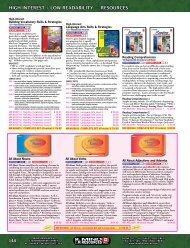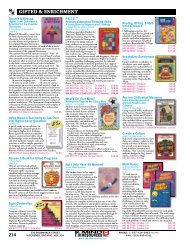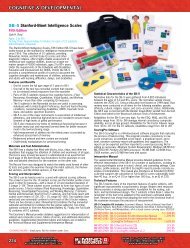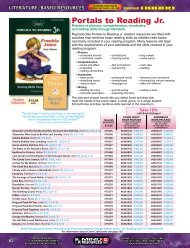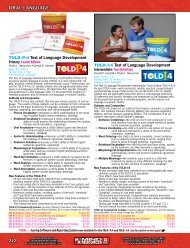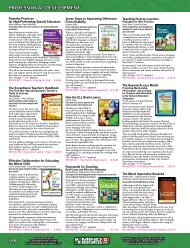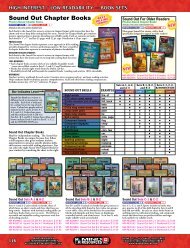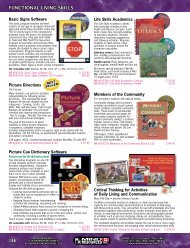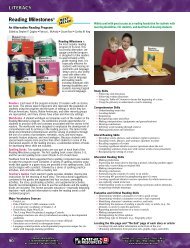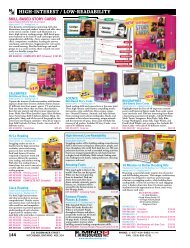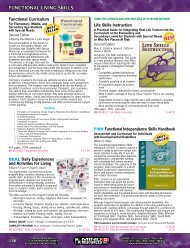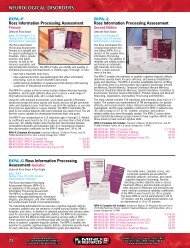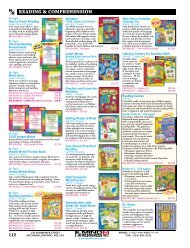Counselling and Therapy (pages 236-245) - Mind Resources
Counselling and Therapy (pages 236-245) - Mind Resources
Counselling and Therapy (pages 236-245) - Mind Resources
You also want an ePaper? Increase the reach of your titles
YUMPU automatically turns print PDFs into web optimized ePapers that Google loves.
COUNSELLING AND THERAPY<br />
Common Ties<br />
Living Together in a Multicultural World<br />
Patricia del Valle, Ph.D., NCC, Maria Gondra, Psy.D., <strong>and</strong> Raysa Richardson,<br />
Ph.D.<br />
Ages 8 to 12<br />
When children enter a new culture, they often experience<br />
fear, anxiety, <strong>and</strong> stress. These children <strong>and</strong> their<br />
native-born peers are engaged in a socialization process<br />
— the former learning to navigate in a new environment,<br />
the latter learning to welcome children from<br />
unfamiliar cultures. Common Ties eases this process by<br />
helping children find shared feelings <strong>and</strong> experiences<br />
<strong>and</strong> accept differences in a non-divisive way.<br />
To start, each player is given a “passport.” The goal is<br />
to travel around the colorful game board, visiting seven<br />
geographic regions <strong>and</strong> answering questions posed on<br />
game cards. Appropriate answers are rewarded with<br />
tokens that players can insert in their passports.<br />
Game cards address friendship, emotions, customs,<br />
responsibilities, family traditions, holidays, favorite<br />
activities, <strong>and</strong> more. To introduce a bit of geography<br />
<strong>and</strong> stimulate discussion about other cultures, some<br />
cards ask players to identify countries based on clues<br />
provided. In addition, blank cards are included so that<br />
you can create questions relevant to your particular<br />
group.<br />
Common Ties helps newcomers learn <strong>and</strong> internalize<br />
the traditions, behaviors, <strong>and</strong> values of their new<br />
culture without losing their identities or respect for<br />
their original cultures. In a parallel process, it helps<br />
native-born children underst<strong>and</strong> cultures different<br />
from their own.<br />
For 2 to 4 players or teams.<br />
MR #050221 Common Ties $ 55.95<br />
Use Your I’s<br />
Donna L. McGoff, M.S.<br />
Ages 5 to 10<br />
Learning to be assertive instead of aggressive can be<br />
very effective in reducing anti-social behaviors. And<br />
one of the best ways to teach children assertiveness<br />
skills is by training them to use “I-Messages.” An<br />
I-Message is a way to express your feelings in a nonthreatening<br />
manner, by structuring statements in a<br />
specific way. When children use I-Messages to express<br />
themselves, they are more likely to be heard <strong>and</strong> less<br />
likely to get into conflict.<br />
Use Your I’s is a board game that teaches children<br />
how to express their feelings without jeopardizing the<br />
rights of others. Game cards provide realistic situations<br />
that provoke emotions such as anger, guilt, humiliation,<br />
happiness, <strong>and</strong> embarrassment. Players learn to<br />
verbally describe their feelings to others <strong>and</strong> explain<br />
why they feel the way they do. Use Your I’s also helps<br />
children become comfortable using the first-person<br />
pronoun to share their feelings.<br />
MR #050267 Use Your I’s $ 45.95<br />
Help kids discover their strengths.<br />
The Self-Concept Game<br />
Berthold Berg, Ph.D.<br />
Ages 8 <strong>and</strong> up<br />
The Self-Concept Game is an excellent tool to improve<br />
self-esteem. This appealing board game is an excellent<br />
way to engage—<strong>and</strong> treat—children who are too<br />
old for puppets <strong>and</strong> toys, but too young to express<br />
themselves readily in therapy. It improves self-esteem<br />
by giving children a clearer, more realistic picture of<br />
themselves in five areas: Scholastic Competence; Social<br />
Acceptance; Physical Appearance; Athletic Competence;<br />
<strong>and</strong> Behavioral Competence. It helps them<br />
discover their strengths <strong>and</strong> teaches them strategies for<br />
maintaining <strong>and</strong> enhancing self-esteem.<br />
To focus discussion, you can choose appropriate<br />
game cards based on the child’s responses to the Self-<br />
Concept Inventory <strong>and</strong> the Cognitive Orientation<br />
Inventory, both included in the game manual. Generally<br />
played by a therapist <strong>and</strong> one or more children,<br />
the game can also be used by parents or used in the<br />
classroom.<br />
MR #050272 The Self-Concept Game $ 56.95<br />
The Self-Concept Workbook<br />
Berthold Berg, Ph.D.<br />
This workbook reinforces self-esteem by encouraging<br />
a realistic evaluation of strengths <strong>and</strong> weaknesses. The<br />
child learns to apply nine different kinds of self-talk:<br />
Accepting Compliments, Making Realistic Comparisons,<br />
Not Overreacting to Failure, Minimizing<br />
Criticism, Recognizing Strengths, Expecting What’s<br />
Reasonable, Expecting Success, Praising Self, <strong>and</strong><br />
Taking Credit.<br />
Using self-talk, the student can improve his or her selfconcept<br />
<strong>and</strong> sense of competence in relation to school,<br />
friends, sports, behavior, <strong>and</strong> physical appearance.<br />
MR #050273 The Self-Concept Workbook $ 22.95<br />
Self-Concept StoryCards<br />
Berthold Berg, Ph.D.<br />
Here is the answer for client-centered therapists who<br />
want to add some structure to counseling sessions.<br />
Children’s responses to the illustrations <strong>and</strong> your story<br />
prompts reveal needs <strong>and</strong> conflicts. You can then help<br />
youngsters revise their stories to express more adaptive<br />
values. This process fosters a transfer of learning to the<br />
child’s own experience.<br />
MR #050274 Self-Concept StoryCards $ 33.95<br />
Self-Concept Thinking Skills Puppet<br />
DVD<br />
Berthold Berg, Ph.D.<br />
This most engaging component of Berg’s self-concept<br />
program clearly demonstrates the nine cognitive-behavioral<br />
principles taught by the game, workbook, <strong>and</strong><br />
story cards. The DVD presents two vignettes for each<br />
skill <strong>and</strong> two scenes (positive <strong>and</strong> negative models)<br />
for each vignette. An accompanying manual provides<br />
scripts, so you can easily present the skits yourself if<br />
you prefer. Best used in t<strong>and</strong>em with at least one of<br />
the other self-concept tools by Berg, this is an ideal<br />
introduction to game playing or storytelling sessions,<br />
especially for younger children.<br />
MR #050275 Self-Concept Thinking Skills Puppet DVD $ 56.95<br />
The self-esteem game that draws from the child’s own world<br />
Exploring My Self-Esteem<br />
Arley Loeffler, LCSW<br />
Ages 5 to 12<br />
Exploring My Self-Esteem is a nonthreatening game<br />
that draws on each child’s experiences <strong>and</strong> emotions,<br />
revealing for the therapist how children see themselves<br />
<strong>and</strong> how they typically deal with their feelings.<br />
Sentence completion cards deal directly with selfesteem<br />
issues, while other game elements elicit clinical<br />
information indirectly. Players have the opportunity,<br />
for example, to tell stories about various aspects of<br />
their world, thereby giving the therapist a chance to<br />
examine feelings, relationships, <strong>and</strong> responses to the<br />
events presented in the stories. The therapist can<br />
select meaningful material from the child’s stories <strong>and</strong><br />
incorporate it in the child’s treatment. As the game<br />
is played, the therapist can tell stories, too, modeling<br />
self-expression <strong>and</strong> showing children that feelings are<br />
normal <strong>and</strong> that the impulses resulting from strong<br />
feelings can be managed. This is an exceptional tool<br />
for improving self-esteem.<br />
The game can be played by a therapist <strong>and</strong> up to 5<br />
children.<br />
MR #050276 Exploring My Self-Esteem $ 55.95<br />
Feeling Good<br />
Crystal Barber<br />
Ages 9 to Adult<br />
Sometimes we need a little help to feel good about<br />
ourselves, whether it’s a compliment from a friend or<br />
a kindly gesture from a neighbor. And, now there’s<br />
another source of help: All you have to do is play the<br />
Feeling Good game. “Feeling Cards” get players thinking<br />
positive thoughts <strong>and</strong> help them recognize what<br />
makes them feel bad. “Doing Cards” give players the<br />
opportunity to act out feelings through role playing<br />
<strong>and</strong> drawing. Originally developed to help people<br />
recover self-confidence <strong>and</strong> optimism after a traumatic<br />
event or situation, Feeling Good encourages players to<br />
feel good about themselves by recognizing, underst<strong>and</strong>ing,<br />
<strong>and</strong> expressing their emotions.<br />
Up to 4 individuals or teams.<br />
MR #050277 Feeling Good $ 55.95<br />
PHONE 877-414-6463 (TOLL FREE)<br />
FAX 877-585-2992 (TOLL FREE)<br />
www.mindresources.com<br />
MIND RESOURCES<br />
130 SHOEMAKER STREET<br />
KITCHENER, ONTARIO N2E 3G4<br />
241



